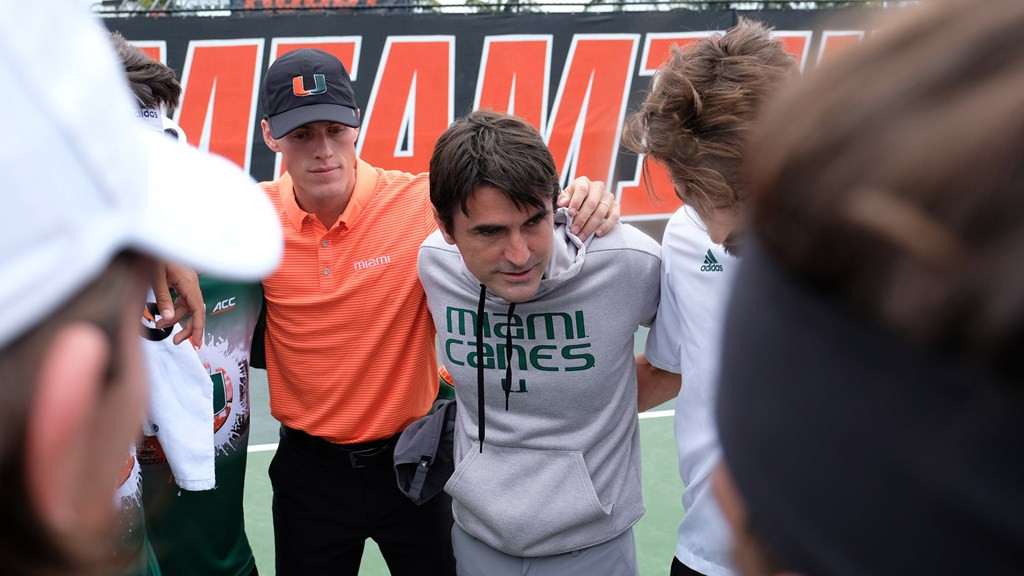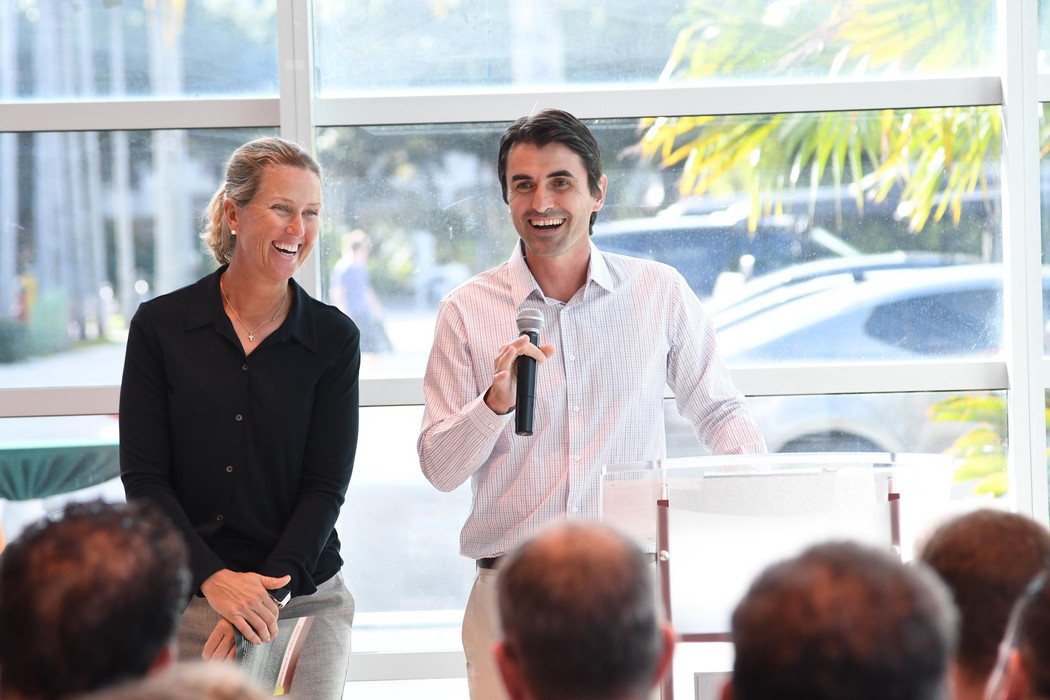
Coming into the Light
By Nicole Rankow
HurricaneSports.com
It’s September 15, 1992. An ethnically rooted war in Bosnia and Herzegovina has been escalating over the last four months. It’s also Aljosa Piric‘s 15th birthday.
He is having a small gathering with a few friends and his family, in the basement of his home, because outside, there is threat of sniper fire, grenades and brutal attacks being executed by neighbors who are now soldiers in a civil war. The tennis courts were turning to graveyards, and the only way out for a young Piric was through tennis.
Two days later, Piric’s dad told him he would be leaving the country. He didn’t know where he would go or how long he will be gone for. Four days later, on September 19th, Piric is boarding a bus and saying goodbye to his parents and his home. “Before I had kids, I didn’t really understand how big a decision that was. Now as a dad, as a father, to put my son on a bus and just have him leave and not know where he’s going, I don’t know how to do that. I really don’t.” Piric said.
The heaviness of that day and the journey that brought Piric from Bosnia to Miami, is one that is echoed in his own words, when asked about the solitary nature of the game that got him here.
“Tennis is a sport that you need to develop tough skin and emotional stability, for sure. Because you’re the one out there, who is winning, who’s losing. If you lose, it’s you …
“People that can cope with adversity and things, they turn out to be better players than the kids that cannot. And that’s the differentiator for becoming really good at this game.”
At just 15, Piric was alone, he had a few friends, but no family or familiarity left to speak of.
His escape was part of the humanitarian effort coordinated by the Bosnian and U.S. Olympic Committees; a program called “Save the Athletes of Bosnia.” He played tennis in Croatia, then was moved to Italy, and ultimately landed in the United States a year later.
When asked about the journey, Piric recounted that “the first three months were kind of fun because I was hanging out with my friends. And then it hit me a couple of months in, I’m like, ‘Man, I don’t get to see my parents.” And then when I went to Italy, and it hit me more. And then when I came to the States, it was a culture shock, for sure. It was a little bit numbing. You just kind of took everything that came, and it was what it was.”
Piric was 16 when he arrived in Tampa, Fla., at the Palmer Tennis Academy, where he was paired up with a young man from Monterrey, Mexico, named Jorge Melomuskis. They were roommates and became friends during the six or seven months that Piric was in Tampa. “[H]e was a guy, yeah, a boy really, but he was a guy who kind of mentored me through that period,” Piric recounted with a smile, not having said that name in many years, “he took me under his wing.”
Piric and Melomuskis would watch MTV after playing tennis all day. It was 1993, MTV was in its prime with shows like The Real World, MTV Spring Break, Unplugged, and videos by bands like R.E.M and Nirvana. “So, literally, we would watch MTV Spring Break and music videos and I was learning English through that and this guy Jorge, who was helping me. It was a way out, just kind of like see something different and just block out everything else out that was going on in my life at that time.”
After Tampa, Piric was relocated once again, where he moved in with Peggy and Dave Thorne, a host family in Richmond, Va. The Thornes were familiar with the world of competitive tennis, as parents to Kenny Thorne, who was, at the time competing at the professional level.
There is something ritualistic in the concept of finding your tribe, the people who you identify with, that make you feel safe. For Piric, that rite of passage began in Richmond. “Probably about a year in, my life changed. I mean, I became a Christian there. So, that was a huge moment in my life, really. And that’s kind of when I settled in and really became more grounded in what was happening and understood things a little bit more.”
In addition to finding his faith, he took up water skiing, a Thorne Family Tradition, played tennis for the high-school team, rising to the rank of number one in the state.
In his junior year, Piric played in a tournament at the University of Richmond that was open to the public. The Richmond men’s team was playing in the tournament and Piric was slated to play their best player in the first round.
“This guy was a senior in college, who was like ranked 50 in the in college at that time. He was like Adria [Soriano Barrera], basically.” Piric played him toe-to-toe, “I had a match point on this guy. And … I’ll never forget this. I hit a backhand down the line, and the ball was like this far in. Match over. I win the match. The guy calls it out.” Piric flipped out. “I ended up losing that match. But looking back, it actually worked out because, the coach, at that time basically recruited me because of that match. Literally a few months later he said if I ever wanted to go to Richmond, I would have a scholarship.”
Piric knew tennis was his only way to college. He also knew that he wasn’t interested in moving again. Richmond was home now, and getting that offer was a huge relief for him, “I knew I could go there, and I just didn’t want to look anywhere else. That was it.”
After college, Piric was again in a situation where his future was uncertain, one where it was up to him to keep his cool and find a way to win, not on the court but in the life he had become accustomed to and wasn’t ready to give up.
He got a job at a posh country club in Connecticut teaching tennis. But the real purpose of that job was to make contacts and secure a position in a company that would sponsor his work visa.
His plan worked, by the end of the summer he had accepted an offer to work in New York City working in finance for a large firm.
It only took six months for Piric to realize that the New York finance scene was not for him, but he stayed there for four years because of the visa. “The visa was always at the forefront. Because without that, there’s no staying.”
It’s not a unique situation, but it is one that most Americans never consider when they are in the job market. That kind of freedom of choice, is something many of us take for granted.
With the help of a good lawyer, he was able to transition the visa to a local club in Connecticut where he had been teaching at on the side. He applied for a Green Card, but during that time, there was no changing jobs.
That Green Card took six years to come through.
Within a couple of months of getting that little green card, and the freedom that came with it, he got a call from the head coach of Georgia Tech, Peg and Dave’s son, Kenny Thorne.
Over the years, Thorne, had become something like an older brother to Piric. “I always looked up to him quite a bit. He had a professional career when I was in high school. And I always kind of thought I would follow in those footsteps. And then when he became a coach, that opened up my eyes that, hey, that’s a possibility.”
It didn’t take much convincing for Piric to accept the offer. “So, it all worked out, and everything was timed perfectly, looking back” Piric said with a smile, “I always kind of believe that we’re put in places where we’re supposed to be. I had to go through that. It was a plan for me at that moment.”
Piric spent three years recruiting, coaching and learning from his mentor at Georgia Tech. He then took a head coaching job at Old Dominion, in 2011. After five years of continued growth and success for the Monarchs, he was offered the job as head coach for the Canes.
Piric followed a progression in college coaching that on paper seems obvious but the path to head coach at a Division I school is not something that is given to just anyone with some titles on their resume. Piric’s experience, work ethic, and talent for recruiting paved the way for his success.

One of the hardest parts about coaching tennis at the college level is breaking athletes out of the mentality of solidarity and embracing the cohesion that is required to be part of the team.
Piric understands that better than most, his life embodied that transition. He has continuously recruited at a high level, recognizing character above talent, and knowing what it means to be a part of a family, not one bound by blood, but one forged, through trust and a common purpose.
“It’s not about one person. It’s about 10 people coming together for one goal. So it’s a big transition for a lot of guys. Some guys cannot adapt. But that’s where recruiting comes in play, and we try to recruit the kids that they kind of buy in to trying to establish this team be about,” said Piric.
If you ask his players, what the biggest difference is about the team now as opposed to five years ago, they all agree: discipline and the cohesion.
“We were close off the court before Coach Piric arrived, but now we are close on the court” said team captain Dane Dunlap. His sentiments were echoed by volunteer assistant coach Niclas Genovese, “The team had no discipline before, now they do.” They show up on time and take practices seriously, working toward a common goal and letting each other know that they are there for one another.
Piric’s team culture is one of cohesion, and at the end of the day it’s not just about the winning — its about “helping these guys grow, becoming better people, better men.”
Before the ACC suspended their season due to the COVID-19 pandemic, the Hurricanes (10-2, 3-0 ACC) were edging back into the top 20 (No. 21), a place they hadn’t come close to since 2010, having just defeated FSU (No. 25) and getting ready to face UNC (No. 2).
While the Canes have been sidelined during, this tumultuous and unprecedented time in our country, I can’t think of a better man to lead them through it.
To quote Piric, when speaking on hard times, “You just have to roll with it and do the best you can. You know? Life happens.”








